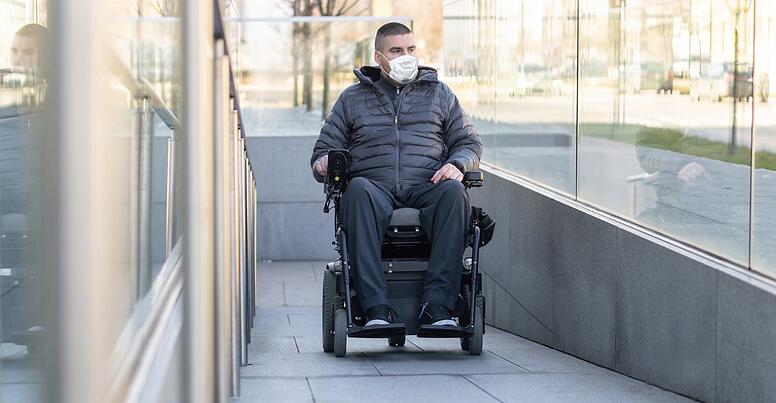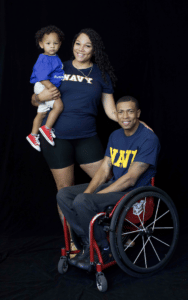A Look Back at 2020
Posted By PVA Admin on December 29, 2020
It was a year that challenged us as a collective in ways we could not have imagined, but PVA remained focused on the needs of our members, veterans with spinal cord injury and disease, such as MS and ALS.
PVA National Treasurer and U.S. Navy Veteran Tom Wheaton notes that when tragedy strikes – whether it be a hurricane, a wildfire, or in this case, a global pandemic – PVA acts as “boots on the ground” for veterans and their families in a variety of ways. Some of our major accomplishments in 2020 include:
COVID Response: Our members have unique health challenges and ongoing needs that put them in one of the most at-risk groups for COVID-19. When the pandemic hit, PVA launched a nationwide campaign to bring awareness to the difficulties they were facing. We worked closely with the VA to ensure that paralyzed veterans had access to the care they need, and we asked lawmakers to prioritize the needs of paralyzed veterans and all people with disabilities during the crisis. We also developed a dedicated webpage of COVID resources so veterans could find answers to their questions quickly.
Across the country, PVA Chapters enacted emergency relief funds and gave out gift cards for groceries and supplies. In April Field Services initiated “COVID-19 Calls,” an outreach project to contact the surviving spouses of our members and clients to check on their welfare. To date we have contacted over 6,882 surviving spouses and over 13,000 members to check on them through our Annual Member Interviews.
Earned Benefits: PVA National Service Officers across all 50 states, D.C. and Puerto Rico secured over $91,000,000 in new annual and retroactive monetary awards for veterans.
Architectural Assistance: In 2020, PVA Architecture responded to many dozens of requests for accessible design assistance. Our architects helped homeowners with renovations to make their homes more accessible, and they assisted business owners to make their places of business more inclusive and welcoming for people with disabilities. PVA Architects also helped educate the public on proper accessible home design through Abilities Expo seminars, and a quarterly column in PN Magazine titled ‘Around the House‘ which addressed improving wheelchair accessibility in various parts of the home.
Vocational Services: In 2020 PVA’s employment program placed over 235 clients in employment, education/training, or volunteer opportunities. This support included writing resumes and developing LinkedIn profiles; assisting clients with stress management, time management, and housing needs; filing unemployment applications; applying for jobs when the veteran does not have access to a computer/internet; and simply being there when a veteran feels isolated and needs support. A new virtual engagement initiative called PAVE Connect was launched in January and offers veterans who do not have the time, means, or ability to attend traditional employment and educational events a way to keep engaged and connected online. It proved to be a valuable resource once working from home became the new norm.
Sports and Recreation Events: While in-person events were cancelled, PVA made sure Veterans were able to keep connected with their peers and receive emotional support while also maintaining physical activity. Our sports and recreation department organized a variety of different programs, such as wheelchair dance, adaptive yoga, monthly book club, cycling, nutrition classes, and more. We even held our first-ever virtual car show. Over 5,800 people participated in over 16 different programs and 416 total events – all from the comfort of their own homes.
30th Anniversary of Americans with Disabilities Act: July marked the 30th anniversary of the Americans with Disabilities Act, which PVA helped create. Our advocacy on behalf of paralyzed veterans has made America more accessible for all people with disabilities, but there is still work to do to bring all public areas into compliance. An important part of our campaign to make America accessible focused on voting in this election year. The Government Accountability Office found that less than half of polling places were accessible in the last presidential election – and during 2020, the landscape was even more difficult due to the pandemic. Because laws, deadlines, and processes vary from state to state, we provided detailed information and resources so everyone who wanted to vote could do so, especially our veterans who fought to preserve that privilege.
Legislative Advancements: PVA had some major legislative victories in 2020 and also worked hard to advocate for our members in coronavirus-response legislation. In addition, members and staff testified on issues relating to air travel access, automobile grants, and social security. With the start of the 117th Congress, PVA will continue to advocate for policy priorities that directly impact our members.
May – the House passed H.R. 6800, the HEROES Act, which included PVA-authored language to temporarily increase VA’s Special Monthly Compensation/Aid & Attendance benefits by 25 percent to help ensure catastrophically disabled veterans can afford necessary care.
August – In a major victory for PVA, the President signed into law the “Ryan Kules and Paul Benne Specially Adaptive Housing Improvement Act of 2019,” which ended a concerted two year effort by PVA to improve VA’s Specially Adaptive Housing benefit for catastrophically disabled veterans.
October – Phase One of the expansion of the VA’s Expanded Caregiver Program began. This was a top PVA priority. “For too long, veterans of earlier service eras have been denied access to the critical benefits and services provided by this program,” said Carl Blake, PVA Executive Director. “We are also very pleased that the program will now consider veterans with catastrophic illnesses like MS and ALS for eligibility.”
December 10 – The Veterans Health Care and Benefits Improvement Act of 2020 passed the House and went to the President to sign, containing language drawn from more than two dozen veteran-related bills. We are especially delighted with its inclusion of the Deborah Sampson Act, which strives to improve health care for women veterans. Provisions would prioritize retrofitting of facilities to ensure they meet environment of care standards; ensure each VA facility has accessible clinically appropriate prosthetic appliances for women; and require a study on infertility services provided by the VA.
PVA looks forward to continuing our momentum in 2021 as we begin our 75th Anniversary celebration. We want all veterans to know: you are not alone. If you need help, please reach out to one of our 33 chapters across the country.

